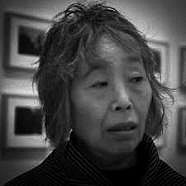BIOGRAPHY

1947-
Ishiuchi Miyako was born in 1947 to a country whose culture had been infiltrated by the influence of the US servicemen living on the naval bases in major ports and cities during the military occupation post World War II. The presence of the western soldiers had a profound effect on Ishiuchi’s early childhood, and inspired her to produce her first body of work- ‘Yokosuka Story’. Ishiuchi Miyako was one of a renowned group of Japanese photographers, including Shomei Tomatsu and Daido Moriyama who confronted the trauma of post – war Japan and the dawning of a new era by using their cameras as tools to express, record and explore what it meant to be Japanese at this pivotal moment in history. Her work is much admired by both her mentors.
Miyako's personal projects include Yokosuka Story, Apartment, Endless night, Mother’s and Silken Dreams. In 2005 she represented Japan at the Venice Biennale. In 2009, she received the 50th Mainichi Art Award and was invited to participate in the Third ICP Triennal in New York. Her Hiroshima series was exhibited at the Museum of Anthropology in Vancouver, Canada, from 2011 to 2012. In March 2014 she received the prestigious Hasselblad award. Her solo exhibition titled“Postwar Shadows" opened at the Getty Museum in Los Angeles in October 2015.
Frida by Ishiuchi Miyako (2013) is a photographic record of Mexican artist Frida Kahlo's wardrobe and belongings. Following Kahlo's death in 1954 her husband Diego Rivera began placing her personal effects into the bathroom of their Mexico City house, "The Blue House", which later became the Museo Frida Kahlo. Rivera gave instructions that this room should remain sealed until fifteen years after his death and it in fact remained unopened until 2004 when the museum decided to organise and catalogue the contents. Ishiuchi Miyako was invited to photograph these artefacts, over 300 unseen relics of Kahlo's life. Ishiuchi Miyako knew very little of Frida Kahlo, the artist, when she arrived in Mexico. She came to know her through her photographs, obsessing over the traces that Kahlo as a woman left on her belongings; the paint stains and stitching which bear the imprint of their owner. There are echoes of her past projects throughout, the same focus cast on the puckered darning of Frida's wardrobe as previously seen in her documentation of her mother's scars prior to her death. Flesh or fabric the scars are the same, in Ishiuchi Miyako's own words she is drawn to them "because they are so much like a photograph… They are visible events recorded in the past". As in her previous work the power of the portrait that emerges lies in the absence of the subject. The images reflect the viewer, acknowledging the fragile traces we all impart upon our environment and belongings.
